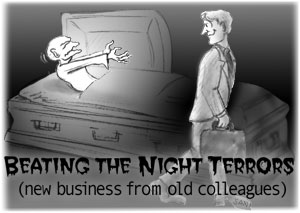 |
|
||||||||||||
 |
|
||||||||||||
|
When prospects for future work look bleak... When you're starting to feel more unemployed than self-employed... When the spectre of failure is making a cold sweat break out on your forehead... It's time to think of the past, pick up your shovel, and dig up old colleagues. |

|
|
By Judy Fireman
|
It's the rare and perhaps non-existent independent professional who doesn't devote a good deal of time to hustling new business. That 3 o'clock in the morning fear, "Where will my next assignment come from?" is too familiar to all of us. (Cold comfort: Fortune 500 CEOs worry where their next big revenue source will come from, too.) In the best of times, the future is always lurking. Here's the good news: when you get those middle-of-the-night terrors, you can look to your past for relief. Getting business from old colleagues is the most common way that an IP starts a solo career. Typically, you believe that you can establish a business on two building blocks: your acquired (or natural) skill set and the prospect of capitalizing on your past connections. That's how Jan Gobel, who recently began publishing greeting cards, is building his business: "I sat down and went through customer lists from my previous lives and wrote a personal letter announcing my new venture," he says. "My current sales reps are also contacts from the past. Together, we are building on our histories together. All those old relationships have formed the foundation of my independent venture." While Gobel's work history might have provided him with a wider network of pre-existing customers than most of us can muster, his initial reliance on former colleagues is common. "My first client was someone I had worked with a while ago," says electronic-commerce consultant Elle Tracy. "Then I got lucky and another came along. My business is growing nicely, and I now have the luxury of connecting with absolute strangers." To foster a general sense of community among her colleagues, Tracy has recently organized a 'breakfast club' of like-minded IPs who meet once a month to swap information and leads. The percentage of work IPs receive from old colleagues varies. Cheryl Long, who has been in business for herself for eight years, creates and manages promotional programs for magazines. She says that only about 20 percent of her business comes from old colleagues, a proportion she says she's happy with at this point in her career. Still, Long makes the effort to nurture old relationships, in part by occasional visits to her former workplace . "I find that just being in the halls of the company where I used to work puts me in contact with new possibilities," she says. "People see me and remember projects they need to have done." Lila Gault, a marketing consultant to the food and wine industries, is much more dependent than Long on past coworkers. "About 80 percent of my business comes from people I have worked with in the past, or from people who are familiar with work I've done for others," she says. "Friends of friends say, 'Let's call Lila. Didn't she do a great job for what's-his-name?'" Doing repeat business with old clients obviously simplifies the process of pitching new business. "I'm thrilled when an old client calls," says Gault, "because it means I can concentrate all my energies on creating good programming. I don't have to spend a lot of time selling myself in." Maintaining old ties -- business or personal -- clearly makes good sense. "I've been working in the online world for a long time, and I hope many old friends from there join me in the e-commerce end of the industry," says Tracy. "Working with old friends makes 'going it alone' feel safer. I like having friends on the frontlines beside me." After years of working on staff in various museums, Zette Emmons went out on her own as a curator and exhibition coordinator. She makes a point of attending show openings and keeping in touch with her many contacts in the museum world. "I'm extremely gregarious, so I know a lot of people in many different museums, and I try to keep up with lots of them. I get virtually all of my business from friendly calls to old colleagues, as well as from a few desperate, begging, and whining calls too." Getting new work isn't easy. You've got to work the phones and take advantage of every chance encounter, but don't forget to mine all those old relationships. In the middle of the night, when you're certain you've hit rock bottom and you'll never find another piece of new business, get up and go through your address book one more time. It holds gold; you just have to uncover it. |
||
|
| |||
|
June 1, 1999 Edited by Eric Gershon Illustration by Lawrence San Production by Keith Gendel |
We'd love to hear your comments about this article! If you like, we'd also be happy to put you in touch with the writer, Judy Fireman, or with any of the other IPs named in this article. | ||
| |||